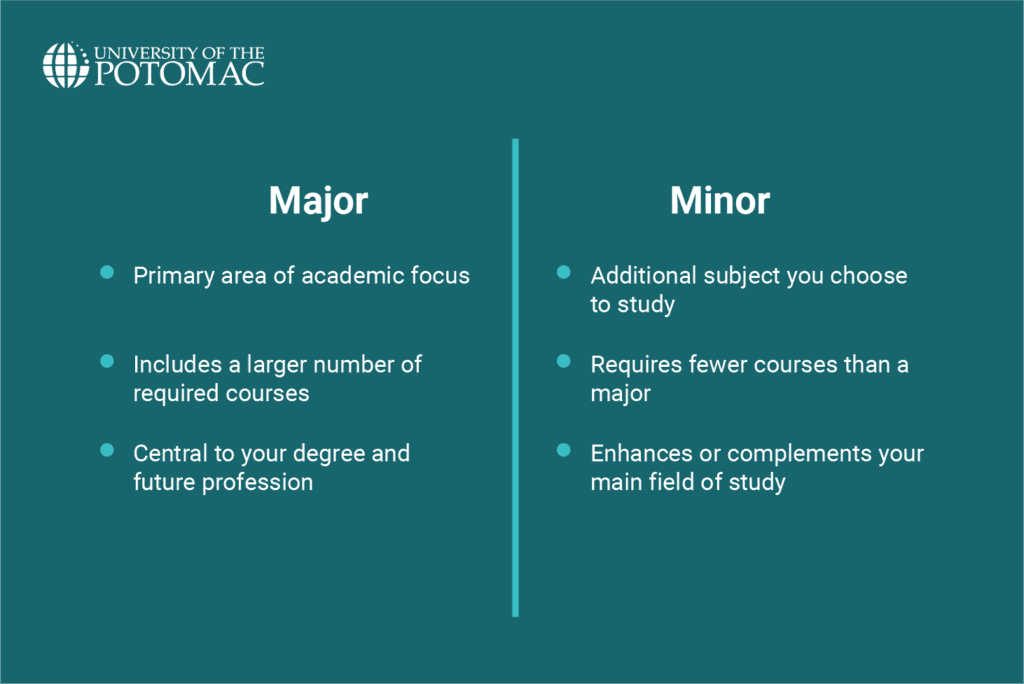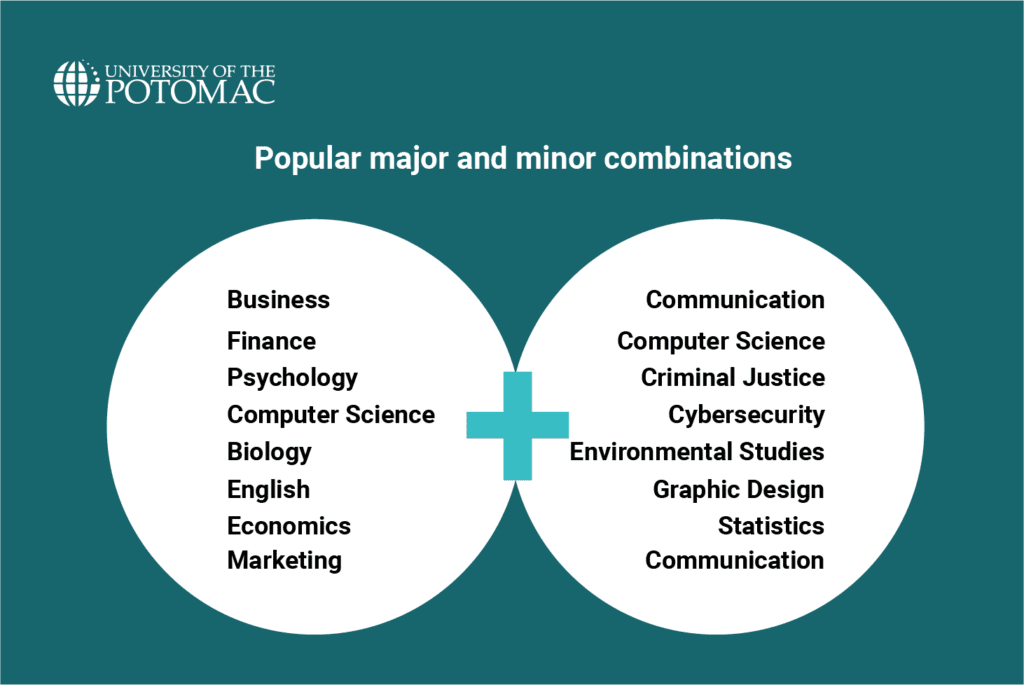Key Takeaways
- A minor represents a secondary field of study alongside your major.
- While a major is your primary academic focus with more required courses, a minor involves fewer credits and adds depth or variety to your education.
- Choosing a minor can strengthen your skill set, expand career opportunities, and let you explore personal interests.
Choosing what to study in college is one of the biggest—and, for many, most stressful—decisions you’ll ever make. With so many possibilities, it’s easy to worry that focusing on one specific subject means closing the door on others. What if you make a poor decision and thus lose out on an opportunity that could have been thrilling or fulfilling?
That’s something a minor can help you with. But what is a minor in college? Well, it’s essentially a way to broaden your academic path without giving up your main focus. Whether you want to build on your college major or branch out into something completely different, a minor gives you room to explore.
What Is a Minor in College?
The majority of your classes and career aspirations are determined by your major, which is your primary field of study in college. But if you’re passionate about more than one subject or want to expand your skill set without taking on a double major, that’s possible through a college minor.
Like the main course of a meal, your major serves as the foundation for everything else you do. Your minor, on the other hand, is like the side dish that complements it—or, in some cases, adds a completely different flavor to your plate.
A minor, as a secondary field of academic study, allows you to explore another area that is related to your major or, alternatively, something entirely different. It gives you room to grow in multiple directions in a much simpler way than fully committing to another college degree.
Differences between a major and a minor

While both are part of your academic journey, there is a clear difference between a major and a minor, and they serve different roles in your education. Your major is your primary area of academic focus. It includes a larger number of required courses and is central to earning your degree and, consequently, preparing you for a specific career.
In contrast to that, a minor is an additional area that you can choose to study alongside your major. It usually requires fewer courses—most typically around five or six classes.
It can either add depth and enhance your major or add variety to your education and reflect a different area of your interest.
How Does a Minor Work in College
Minors in college typically require around 15 to 18 credit hours—that’s roughly half the number required for a major. Some minors have a few required core courses, whereas others typically allow you to choose from a broader list of electives related to that field.
Minors are intentionally designed to fit within different degree programs without overloading your schedule. Actually, in many cases, students can complete their minor without needing to take on extra semesters, especially if they plan ahead and choose the types of courses that meet both general education and minor requirements.
Benefits of Declaring a Minor

Declaring a minor can be one of the most rewarding decisions in your college experience for several reasons, including the following:
Enhance your major with complementary skills
One of the biggest advantages of choosing a minor is the fact that the addition can strengthen your major. By adding knowledge in a related field, you gain a broader, more adaptable skill set.
For example, if you have a Business major and are also pursuing a minor in Communication, you may have an advantage when applying for marketing or public relations roles where clear messaging is of particular importance.
In the same way, an education major who chooses a Psychology minor would have the advantage of having a deeper understanding of student behavior and learning styles compared to those who have only the major.
Expand career opportunities
Flexibility is everything, especially in the job market, where employers value candidates who bring more than just textbook knowledge. Nowadays, they all seek well-rounded individuals to join their teams, the kind who understand how different parts of a business or organization work together.
A minor can help you qualify for a wider range of roles. The possibilities of pairing majors and minors are nearly endless. Some popular combinations include the following:

- Business major + Communication minor
- Finance major + Computer Science minor
- Psychology major + Criminal Justice minor
- Computer Science major + Cybersecurity minor
- Biology major + Environmental Studies minor
- English major + Graphic Design minor
- Economics major + Statistics minor
- Marketing major + Communication minor
Explore personal interests
The ability to learn more about a subject and field you are passionate about without having to compromise your other plans and career goals is just another important advantage of declaring a minor.
You could be a biochemistry major but have a passion for music or be an accounting major who’s always been curious about history. A minor can give you the chance to explore those second fields that excite you without having to change your entire academic path.
Your choice of minor can be incredibly fulfilling and help keep you engaged and motivated, especially when your major courses start to feel intense or repetitive. And who knows—your “just for fun” minor could end up leading you to a new career path and opportunities.
Interested in pursuing a degree?
Fill out the form and get all admission information you need regarding your chosen program.
This will only take a moment.
Message Received!
Thank you for reaching out to us. We will review your message and get right back to you within 24 hours.
If there is an urgent matter and you need to speak to someone immediately you can call at the following phone number:
- We value your privacy.
How to Choose the Right Minor

Choosing a minor isn’t something one should do on a whim. Although it’s true that it does not require as many courses as a major, it can still play a meaningful role in your future career. So, to really benefit from it, you’ll want to put some thought into what you choose and why.
To be more specific, you should consider how well the options you consider align with your aspirations and the university requirements, as well as how they fit overall into your schedule and workload.
Align with your career goals
One of the most direct and easy ways to choose a minor is to ask yourself: Does this support where I want to go in the future? When a minor complements your career aspirations, it adds value to your college degree.
For example, if you’re majoring in journalism, then arguably, one of the best minors you can pick would be digital marketing. This way, you would sharpen your understanding of content strategy and stand out when it comes to various media-related roles.
Check university requirements
Before committing to any minor, it’s also important to first check and understand what your university actually offers. This is due to the fact that not all schools offer every minor, and some programs might even have limitations on the pairing of particular majors and minors.
Hence, take the time to review your university’s academic catalog and check the credit requirements and course availability. Make sure the minor you’re considering fits within your overall degree plan so that you don’t accidentally delay your graduation, especially if you’re already working with a tight schedule or transfer credits.
Consider the workload and commitment
Logically, adding a minor means adding more courses and workload to your schedule. Even if the total number isn’t huge, it still represents a commitment of time and energy.
Therefore, be sure to take some time to ask yourself: Can I manage this in addition to my major requirements and all of my other commitments? Whether it’s extracurriculars, part-time work, or personal obligations, balancing all of it can get challenging.
The goal of a minor isn’t to overload yourself but to enhance your education in a manageable way. That’s why it’s a good idea to also talk with an academic advisor before making a final decision.
Conclusion
The first steps before you begin planning your minor are selecting the right major and university to assist you. At the University of the Potomac, we offer a variety of flexible, career-focused degree programs designed to help you grow.
Whether you’re looking to pursue an associate, bachelor’s, or master’s degree, we provide online options and specializations—along with the same high-quality programs available on campus for those who prefer in-person learning. So, take some time to explore our program offerings and see what fits your goals.
Minors are major choices—with major benefits. With the right foundation at Potomac, you’ll already be one step ahead.
Frequently Asked Questions
Can you add a minor after starting college?
Yes, most students declare a minor after their first year once they’ve explored their interests and discussed options with an academic advisor.
Do minors appear on diplomas?
Usually, minors do not appear on diplomas, but they are typically listed on your official transcript.
Can you change or drop a minor?
Typically, yes, most colleges allow you to change or drop a minor, though it’s best to do so early to avoid scheduling issues or credit loss.










